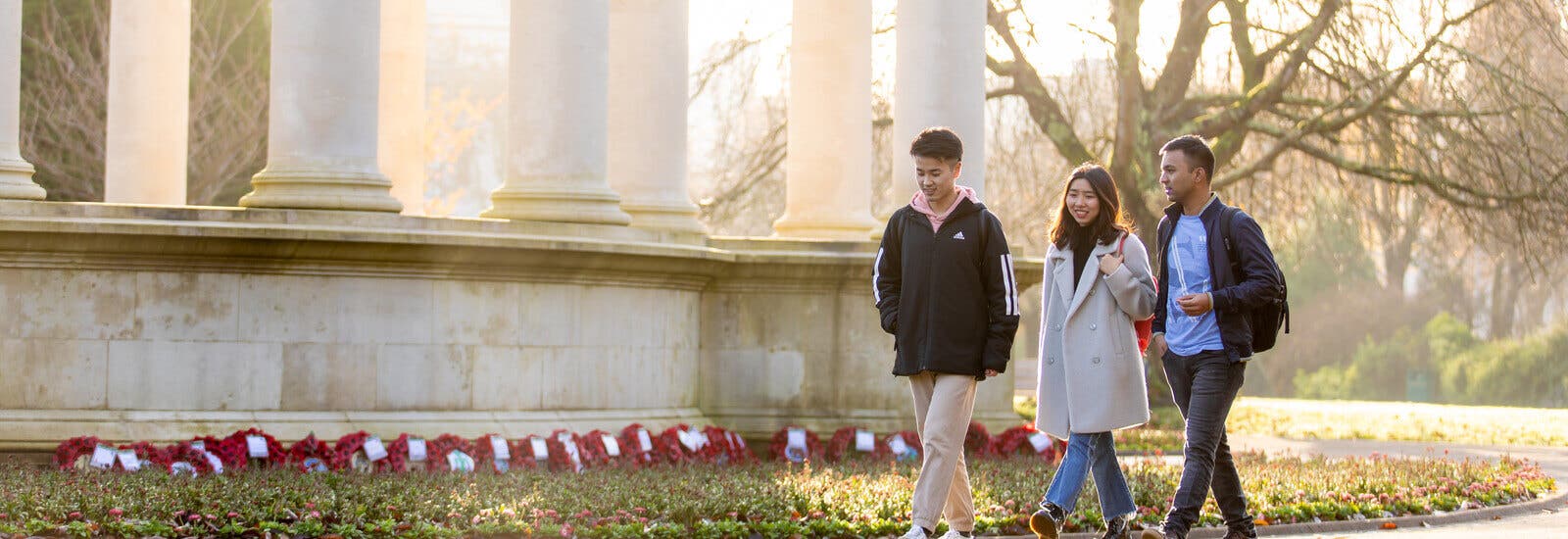International Foundation Year in Arts, Humanities, Law and Social Sciences
The International Foundation Year prepares you for university with English language and study skills practice, as well as subject-specific teaching. When you complete the programme, you will progress to the first year of your undergraduate degree. This pathway allows you to progress to degrees in subjects including English, Journalism, History, Politics and many more. You choose a route depending on which undergraduate degree you plan to study. There are three routes: Law, Arts and Humanities and Social Science. Which route you choose impacts the modules you will study.
Please note for Music, all applications will be referred to the International Study Centre for approval. Applicants are required to show evidence of working towards either Grade 7 or Grade 8 Practical in one instrument or voice (ABRSM/Trinity/Rockschool) + Grade 5/6 Theory (ABRSM/Trinity). This will be assessed by means of a short pre-recorded audition when applying for the International Foundation Year. Equivalent qualifications may be accepted following consultation with Cardiff University.
Key facts
*This intake is not available for progression to Optometry, Dental Surgery, Medicine, Medical Pharmacology or Pharmacy
- Length: Two semesters
- Study mode: On campus
Entry requirements
Check our academic and English language entry requirements
Fees
Visit the Fees page for full details.
Study the world around you
The International Foundation Year prepares you for your chosen undergraduate degree. At the International Study Centre, you will have support as you adjust to life in the UK, with academic and English language preparation to help you when you progress to Cardiff University.
What will I study?
As a student on the Arts, Humanities, Law and Social Sciences pathway of the International Foundation Year, you will study all of the 'core' modules as well as additional modules depending on which subject route you choose.
The Academic English Skills course teaches students the specific academic language skills they need to develop for success at Cardiff University. The course focuses on receptive (listening and reading) and productive (speaking and writing) skills through practice in semi and authentic task-based activities which build a strong foundation in preparation for each student's future studies. This critical module places particular emphasis on developing academic reading and research skills; research-based writing along with presentation and seminar speaking skills.
The aim of this module is to foster the development of basic research skills. The module will reinforce skills that are essential to university study, supporting and consolidating academic skills of the Academic English Skills module and subject areas.
These modules provide a general introduction to discipline and study of humanities and social science. Students will explore a range of topics which will help them understand the nature of social sciences and the processes that cause change locally and globally. Using a wide range of resource materials, students will be equipped with the key skills required for independent study, their personal lives and future employment.
Students on the programme will have a limited and diverse knowledge and understanding about the concept of globalisation. This module is designed to overcome this as well as providing students with a greater awareness of different theoretical perspectives on globalisation. Students will consider real-world events to explore the impact of increasing global interaction and will be encouraged to reflect upon the rise in global interrelations and their impact on nation states.
The aim of the module is to prepare students to engage in extended research in their chosen discipline. The module allows students to put into practice the knowledge and skills gained in the Academic English Skills and Academic Practice modules by undertaking independent research.
Psychology modules
This module offers a comprehensive introduction to psychology’s key concepts, theories, research methods, and ethical considerations. It provides a strong foundation for understanding human mind and behaviour. The module is relevant for students who are interested in pursuing a career in psychology, or in a related field such as business, politics, or healthcare. Additionally, students will acquire transferable skills like problem-solving, communication and research.
Music modules
This module is taught as one of two core music modules for students on the International Foundation Year seeking to progress to undergraduate degrees in music at Cardiff University. The module introduces students to the fundamentals of music, through application of a range of key concepts, developing the requisite skills to successfully progress with confidence onto their chosen undergraduate degree programme. There will be an emphasis on gaining practical skills in musicianship and developing an awareness of the career options available to an aspiring musician.
Please note: modules may be different for students progressing to Music depending on the number of students with the same progression degree aim. Therefore students may study 'Studying Social Life' rather than 'Introduction to Music'.
Making an impact
A top 20 university in the UK for the overall quality of research, impact and environment.
Research Excellence Framework 2021
High ranking subjects
Ranked in the top 100 in the world for English Language and top 50 in the world for Communication and Media Studies
QS World University Rankings by Subject 2025
Progress to your degree
After completing your International Foundation Year and achieving the necessary grades, you can transition to your chosen undergraduate degree. By completing this pathway, you will be able to progress to the following degrees:
Please note, for English Grades: WR stands for Writing.
| Degree Programme Name | Award | Overall Grade | English Grade | Grade Module |
|---|---|---|---|---|
| No Results | ||||
Please note: for the following degrees, all applications will be referred to the International Study Centre for approval.
Applicants are required to show evidence of working towards Grade 8 Practical in one instrument or voice (ABRSM/Trinity/Rockschool). This will be assessed by means of a short audition when applying for the International Foundation Year. Please refer to centre.
- BMus (Hons) Music
- Mus (Hons) Music with a year of study abroad
- BA (Hons) Music
- BA (Hons) Music with a year of study abroad
